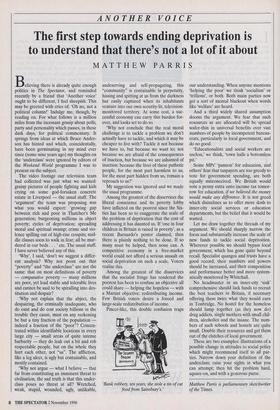ANOTHER VOICE
The first step towards ending deprivation is to understand that there's not a lot of it about
MATTHEW PARRIS
The video footage our television team had collected was just what we wanted: grainy pictures of people fighting and kids crying on some god-forsaken concrete estate in Liverpool — the usual stuff. The `argument' the team was proposing was what you would expect: 'growing gap between rich and poor in Thatcher's Me generation; burgeoning millions in abject poverty; cycles of deprivation; spreading moral and spiritual swamp; crime and vio- lence spilling out of high-rise cesspits; mid- dle classes soon to walk in fear; all be mur- dered in our beds . . . ' etc. The usual stuff. I have never believed any of this.
`Why', I said, 'don't we suggest a differ- ent analysis? Why not point out that "poverty" and "the underclass" are not the same: that on most definitions of poverty — comparative poverty — many millions are poor, yet lead stable and tolerable lives and cannot be said to be spiralling into des- titution and despair?
`Why not explain that the abject, the despairing, the criminally inadequate, who do exist and do cost society billions in the trouble they cause, must on any reckoning be but a tiny fraction of the population indeed a fraction of the "poor"? Concen- trated within identifiable locations in every large city — small areas of quite intense barbarity — they do leak out a bit and rob respectable people, but on the whole they hurt each other, not "us". The affliction, like a leg ulcer, is ugly but containable, and mostly contained.
`Why not argue — what I believe — that far from constituting an imminent threat to civilisation, the sad truth is that this under- class poses no threat at all? Wretched, weak, stupid, wounded, ugly, unlikable, undeserving and self-propagating, this "community" is containable in perpetuity, hissing and spitting at us from the darkness but easily captured when its inhabitants venture into our own security-lit, television- monitored territory. At some cost, a suc- cessful economy can carry this burden for- ever, and looks set to do so.
`Why not conclude that the real moral challenge is to tackle a problem we don't actually have to tackle, and which it may be cheaper to live with? Tackle it not because we have to, but because we want to; not because we are afraid of the consequences of inaction, but because we are ashamed of inaction: because the lives of these pathetic people, for the most part harmless to us, for the most part hidden from us, remain a reproach to us?'
My suggestion was ignored and we made the usual programme.
Among the greatest of the disservices the liberal conscience and its poverty lobby have inflicted on the poorest since the Six- ties has been so to exaggerate the scale of the problem of deprivation that the cost of addressing it has daunted us. If 'one in four children in Britain is raised in poverty', as a recent Barnardo's poster claimed, then there is plainly nothing to be done. If so many must be helped, then none can. A competitive economy in a free-market world could not afford a serious assault on social deprivation on such a scale. Voters realise this.
Among the greatest of the disservices that the socialist fringe has rendered the poorest has been to confuse an objective all could share — helping the hopeless — with a Marxist objective: redistributing income. Few British voters desire a forced and large-scale redistribution of income.
Pincer-like, this double confusion traps Rank robbery, ten years, she stole a tin of cat food from Sainsbury's.' our understanding. When anyone mentions `helping the poor' we think 'socialism' or `trillions', or both. Both main parties now get a sort of mental blackout when words like 'welfare' are heard.
And a third widely shared assumption dooms the argument. We fear that such resources as are allocated will be spread wafer-thin in universal benefits over vast numbers of people by incompetent bureau- crats, particularly in local government, and do no good.
`Educationalists and social workers are useless,' we think, 'town halls a bottomless pit.'
Some MPs' passion' for education, and others' fear that taxpayers are too greedy to vote for government spending, are both equally misconceived. We British would vote a penny extra onto income tax tomor- row for education, if we believed the money would make any difference. It is not greed which disinclines us to offer more dosh to inner-city social services or education departments, but the belief that it would be wasted.
Let me draw together the threads of my argument. We should sharply narrow the focus and substantially increase the scale of new funds to tackle social deprivation. Wherever possible we should bypass local government, which has gone quite beyond recall. Specialist quangos and trusts have a good record; their numbers and powers should be increased, and their composition and performance better and more system- atically monitored by Whitehall.
No headmaster in an inner-city 'sink' comprehensive should lack funds to recruit the best teachers in Britain, if necessary offering them twice what they would earn in Tonbridge, No hostel for the homeless should lump together (as they now do) drug addicts, single mothers with small chil- dren, alcoholics and the insane. The num- bers of such schools and hostels are quite small. Double their resources and get them out of the clutches of local government.
These are two examples: illustrations of a possible change in attitudes to social policy which might recommend itself to all par- ties. Narrow down your definition of the underclass; raise your sights in what you can attempt; then hit the problem hard, square-on, and with a generous purse.
Matthew Parris is parliamentary sketchwriter of the Times.


















































































 Previous page
Previous page